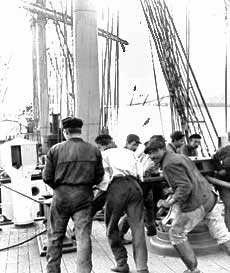Jon-Michael: When Cultures Collide
With the arrival of the Hudson Bay Company (HBC) came the arrival of what would inevitably develop in to modern trade within the Pacific Northwest. Though the HBC had conducted trade with other native groups, their trade with Northwest Natives would, in many ways be similar, and in many ways differ. Where in other parts of the country large geographic regions defined each tribe, within the Pacific Northwest tribes frequently cohabitated and married between tribes. However, trading customs that had prevailed world wide would ultimately facilitate trade between the two groups.
Trade can not commence without both groups of people wanting to accomplish a similar means. In the case of the HBC it was material wealth, and with the natives it was wealth of many types, spiritual, financial, and social standing. To facilitate trade the two groups had to first get to know each other’s idiosyncrasies. Harmon states that “All parties at Dungeness were aware of impediments to communication but tried to signal their desires and intentions thought unmistakable” (pg.19). Though it turned out that their signals were mistakable and the meeting at Dungeness ended in a blood bath. It would be through trial and error that these groups would be able to trade without this type of mishap. It is logical to assume that these language barriers existed between any foreign groups that wanted to commence in trade since the beginning of time. Harmon goes on to say that what the King George Men mistook for the apparent acknowledgement of power by the natives, could also have been the natives acknowledgement that the foreigners “shared or embraced the indigenous social code, which sanctioned retaliatory raids” (pg21). The language barrier between the two groups would only be overcome by the mutualistic desire to trade. If both groups would have found it too dangerous and at all non-beneficial, it is likely that trade would have ended. Again, it is likely that these types of conflicts had occurred since the Minoans first met the Egyptians.
The recognition by HBC of men who were particularly keen on trading was also something that has likely happened since the dawn of trade itself. Harmon says that men like Waskalatchy and Tslalakum “bridged the cultural difference between natives and newcomers” (pg.29). These types of men were essential to any trading company in any part of the world. How, if not by making alliances with locals, could trade commence at all? If there was never any attempt to bridge cultural differences it is likely that relations between the two groups would have disintegrated overtime and may have even ended in war.
Trading customs that had long guided trade world wide facilitated trade between these two groups. The HBC followed a well prescribed list of on how to engage a foreign people, i.e. try to establish a friendly relationship, overcome the language barrier, and have some respect for local customs. The men of the HBC were only doing what had been done for thousands of years. They were practicing long established patterns of gaining respect and then commencing in trade.
Side Note: Although I realize that this is a chapter out of a book on anthropological history, Harmon has not presented any groundbreaking news here. She has merely regurgitated what is widely known about trading practices. Also, she does a lot of presuming using phrases like: it is likely, it is logical, possibly etc etc… This irritates the hell out of me!
